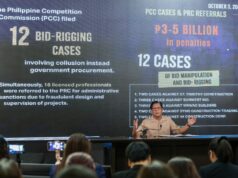PCC may deploy powers against rice middlemen
By Jenina P. Ibañez
THE Philippine Competition Commission (PCC) said it is preparing to investigate whether middlemen are widening the price gap between what traders pay to obtain inventory from farmers and what consumers pay at retail.
The PCC said it may deploy its competition-regulating powers pending the findings of a technical working group (TWG) it formed with the Department of Agriculture (DA) to determine whether the gap between farmgate and retail prices reflects uncompetitive behavior.
PCC Chairman Arsenio M. Balisacan told reporters: “The intention of that TWG is to have a better understanding of the situation of the market. Hopefully with that understanding, we can have a clearer, firmer, more focused investigation if it comes to that, if a conclusion is there is such a problem and an investigation is warranted,” he said.
The PCC on Oct. 1 signed a memorandum of agreement with the DA for mutual assistance in agriculture competition issue. The farmgate price of palay, the unmilled form in which domestic farmers sell their crop, has softened since the enactment of the Rice Tariffication Law in March, while retail prices have not declined to a similar extent.
PCC Commissioner Johannes Benjamin R. Bernabe said that as tariffication puts pressure on farmgate prices to decrease, abusive market dominance or cartelistic behavior by middlemen could exacerbate the farmgate-retail price gap.
“There are middlemen — traders, millers, wholesalers — who are engaged in the distribution, facilitation of distribution of rice to the end-user. If there is concentration, if there are players who are in a dominant position in certain markets for this middle-faced transaction, then is it worsening the gap between farmgate prices and retail prices?” he said.
The PCC has been monitoring the various stages of rice production, focusing on traders, wholesalers, and dealers, and is also looking at the possible involvement of retailers.
“There are certain relevant geographic markets that seem to indicate that it is worth pursuing whether there is some anti-competitive behavior going on (among retailers). But primarily, the ones who have leverage in this value chain appear to be the middlemen,” Mr. Bernabe said.
He said that the commission is still avoiding attributing guilt or liability to any group. Beyond monitoring, he said the PCC is looking to be more actively engaged in analyzing the issue.
PCC can investigate anti-competitive behavior by requesting information from and surveying any industry by region or subregion.
If PCC issues a finding of cartelistic behavior or abuse of dominance, the Philippine Competition Act prescribes corresponding sanctions.
“If it turns out there are cartels — (the charges are) administrative and criminal. If it’s criminal, that comes with admin fines or could (lead to) imprisonment,” Mr. Balisacan said.
Any local government involvement in cartels is not covered by the Philippine Competition Act.
Mr. Bernabe said that any such official’s involvement discovered by the commission will be referred to the Office of the Ombudsman or the Department of the Interior and Local Government.
The Philippine Statistics Authority reported that the average farmgate price of palay fell 1.4% to P15.96 per kilogram (/kg) in the third week of September.
The retail price of well-milled rice and regular-milled rice both fell 0.3% to P42.11/kg and P37.66/kg, respectively.



